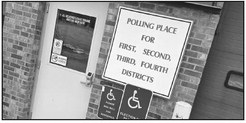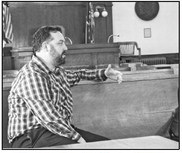Safety is main reason for fee
Black horse-drawn buggies are a fixture on central Wisconsin’s rural highways. The vehicles are one of the more visible displays of area religious communities’ rejection of modern conveniences and desire to live a “plain” existence.
While tourists view the buggies as quaint and mercenary marketers use buggy silhouettes to grab a buck, those who live and work in the region often have a very different view of the horsedrawn vehicles. Some view the vehicles as being a minor inconvenience, slowing traffic down for a few minutes until it is safe to pass. Others grumble at the buggies driving on roads built and maintained with revenue from gas taxes and vehicle registration fees, while buggy owners pay neither. In fairness, these folks also grumble about pedestrians and bicyclists using the roads for similar reasons.
Emergency responders and law enforcement personnel have still another view of the dark-color, poorly lit buggies -- that of tragedies waiting to happen.
While a horse pulling a buggy can only move so fast, a proposed bill making its way through the state legislature would potentially address the two other main concerns of those who share the roads with horse-drawn vehicles.
Rep. Bob Kulp of Stratford was one of the co-sponsors of AB 612. The bill would allow counties to establish registration fees of up to $100 per year for horse-drawn vehicles with the provision that 50 percent of the fee go to the town where the vehicle is normally kept.
The proposal would expand current law that allows counties, towns, villages and cities to set annual registration fees on a local level for motor vehicles under 8,000 pounds. The caveat is that the money must be used for transportation-related purposes and actual administrative costs.
Many of the bill’s proponents focus on the financial gain as these road users will have to pay their fair share of the maintenance expenses. Given the damage that horseshoes and metalrimmed vehicles can do to a road surface, the desire to capture new revenue is understandable, even if potentially short-sighted. In Clark County, at least one religious community made a sizable voluntary donation to the county to contribute toward the maintenance of the roads. While no contribution is made at the county level here in Taylor County, these communities are strong economic supporters of their towns and are an important part of the local tax base.
Beyond any negligible new amount of revenue that may be able to be captured, the bill’s primary potential benefit is to improve public safety.
Registration of horse-drawn vehicles will make it easier for law enforcement to enforce existing safety requirements, such as the use of lights and slowmoving vehicle signs.
The proposed legislation will also open the door to establishing real safety standards for the vehicles that respects the culture and beliefs of those who use them, but which will save lives for everyone on the roads.
Living as a civil society includes the need to balance individual freedom with public safety and shared fiscal responsibility for community infrastructure. Wisconsin legislators should support AB 612 not for its ability to generate additional revenue, but primarily as a way to improve safety for all road users.




